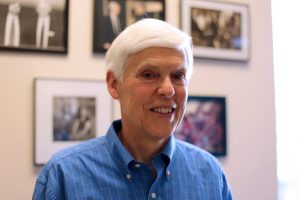About
During my career my research and publications have had three main emphases: 1) African American writers’ crucial contributions to the literature of the American South; 2) 18th– and 19th-century African American writing as a rich field of literary expression and tradition; and 3) the African American slave narrative tradition, both as the bedrock of African American literature and as foundational to any serious comprehension of American literature and culture from the late 18th century to the present. When I emerged from graduate school in 1973, I don’t think any of those three themes of my life’s research would have been considered American literature, at least as American literature was understood at that time. But somehow the fields of study that have claimed me from the early 1970s onward have become increasingly recognized for their profound role in and influence on what we have come to understand as American literature.
My most recent book is Slavery and Class in the American South: A Generation of Slave Narrative Testimony, 1840-1865 (New York: Oxford University Press, 2019). “William Andrews has ‘lifted the veil’ on class relations within the slave community in the antebellum South. Well-meaning scholars, mostly for political reasons, have far too often chosen to remain silent about distinctions of class drawn by black people among themselves, starting in slavery, choosing to discuss African Americans as if they were always a social monolith, and thereby reducing their complexity. Andrews reveals, in riveting detail, that this has never been the case, even well before the Civil War. This is a seminal work of scholarship, one destined to generate a new branch of literary studies, dedicated to studying how class mattered within the African American tradition.”—Henry Louis Gates Jr., Harvard University
Degrees
1973, PhD English, UNC-Chapel Hill
1970, MA English, UNC-Chapel Hill
1968, BA English, Davidson College
Publications
- The Literary Career of Charles W. Chesnutt. (Baton Rouge: Louisiana State University Press, 1980).
- To Tell a Free Story: The First Century of Afro-American Autobiography, 1760-1865. (Urbana: University of Illinois Press, 1986).
- The Norton Anthology of African American Literature, Co-Ed. with Henry Louis Gates et. al. (New York: W. W. Norton, 1997, 2004, 2014).
- The Oxford Companion to African American Literature, Co-Ed. with Frances Smith Foster and Trudier Harris. (New York: Oxford University Press, 1997).
- The Literature of the American South: A Norton Anthology, Gen. Ed. (New York: W. W. Norton, 1997).
- Slavery and Class in the American South: A Generation of Slave Narrative Testimony, 1840-1865 (New York: Oxford University Press, 2019).
Awards
- Chancellor’s Award for Distinguished Teaching, University of Wisconsin-Madison, 1988.
- Norman Foerster Prize, 1976, for article of the year in American Literature
- Choice Outstanding Academic Book, 1986, for To Tell a Free Story
- William Riley Parker Prize, 1990, for outstanding article of the year in PMLA
- Fellow, Center for Advanced Study in the Behavioral Sciences, Stanford University, 1994-95
- American Library Association Outstanding Reference Source, 1997, for The Oxford Companion to African American Literature
- Choice Outstanding Academic Book, 2007, for The Curse of Caste
- James W.C. Pennington Award, University of Heidelberg, Germany, 2015
- Thomas Jefferson Award, University of North Carolina-Chapel Hill, 2015
- Jay B. Hubbell Medal for Lifetime Achievement in American Literature, Modern Language Association, 2017


